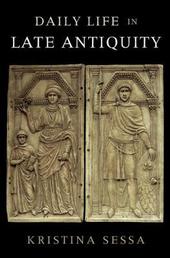
|
Daily Life in Late Antiquity
Paperback / softback
Main Details
| Title |
Daily Life in Late Antiquity
|
| Authors and Contributors |
By (author) Kristina Sessa
|
| Physical Properties |
| Format:Paperback / softback | | Pages:260 | | Dimensions(mm): Height 229,Width 153 |
|
| ISBN/Barcode |
9780521148405
|
| Classifications | Dewey:937.06 |
|---|
| Audience | | Tertiary Education (US: College) | | Professional & Vocational | |
|---|
| Illustrations |
1 Maps; 47 Halftones, black and white
|
|
Publishing Details |
| Publisher |
Cambridge University Press
|
| Imprint |
Cambridge University Press
|
| Publication Date |
9 August 2018 |
| Publication Country |
United Kingdom
|
Description
Daily Life in Late Antiquity is the first comprehensive study of lived experience in the Late Roman Empire, from c.250-600 CE. Each of the six topical chapters highlight historical 'everyday' people, spaces, and objects, whose lives operate as windows into the late ancient economy, social relations, military service, religious systems, cultural habits, and the material environment. However, it is nevertheless grounded in late ancient primary sources - many of which are available in accessible English translations - and the most recent, cutting-edge scholarship by specialists in fields such as archaeology, social history, religious studies, and environmental history. From Manichean rituals to military service, gladiatorial combat to garbage collection, patrician households to peasant families, Daily Life in Late Antiquity introduces readers to the world of late antiquity from the bottom up.
Author Biography
Kristina Sessa is the author of The Formation of Papal Authority in Late Antique Italy (Cambridge, 2012). She is presently writing a book about war, environmental crisis, and the formation of Christian institutions in the late Roman West. Her scholarship has been supported by awards from the ACLS, the American Academy in Rome, and the Italian Academy for Advanced Studies at Columbia University.
Reviews"...fine discussion of urban life...a genuine attempt to introduce Late Antiquity from the lived experiences of its inhabitants...succeeds magnificently." --Medieval Archaeology
|